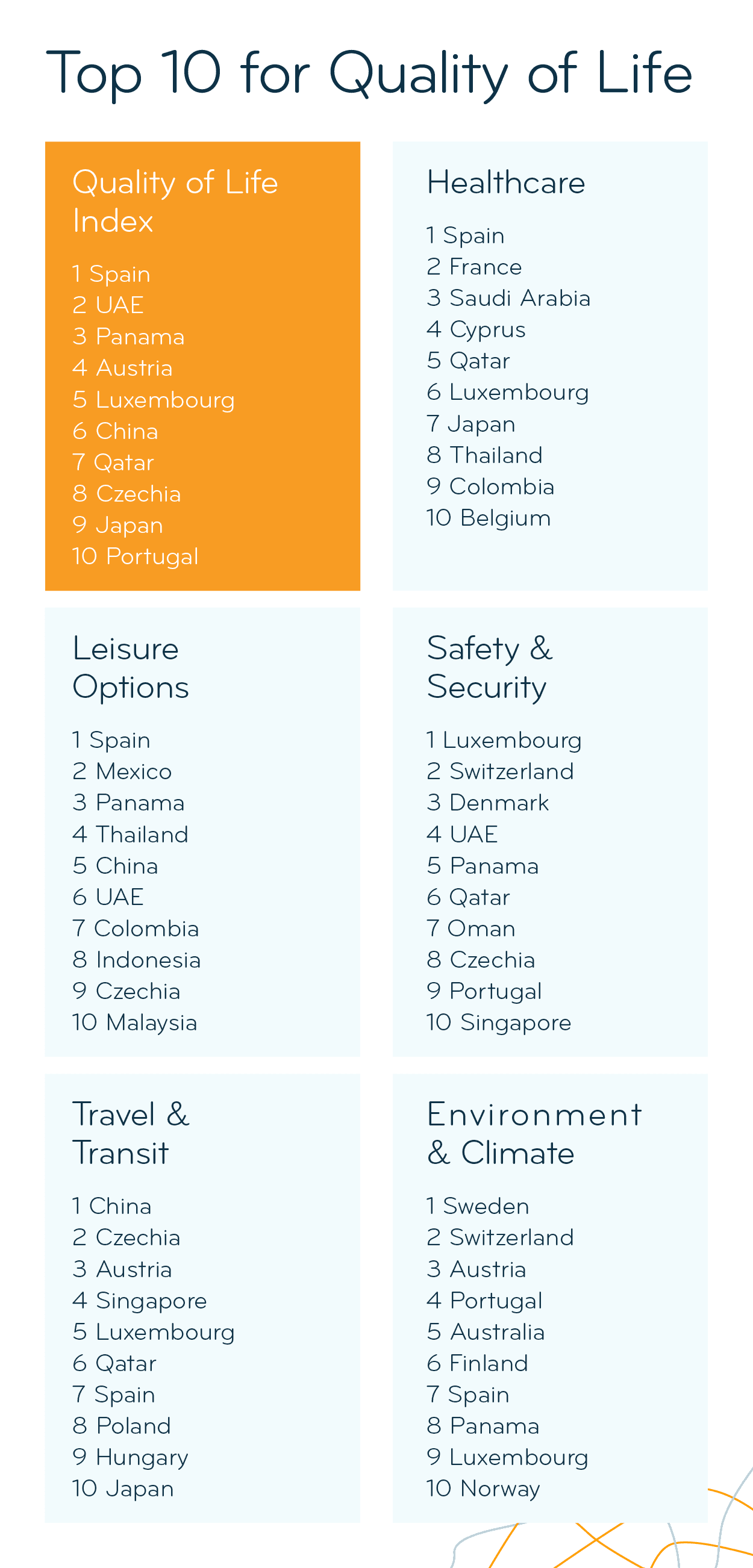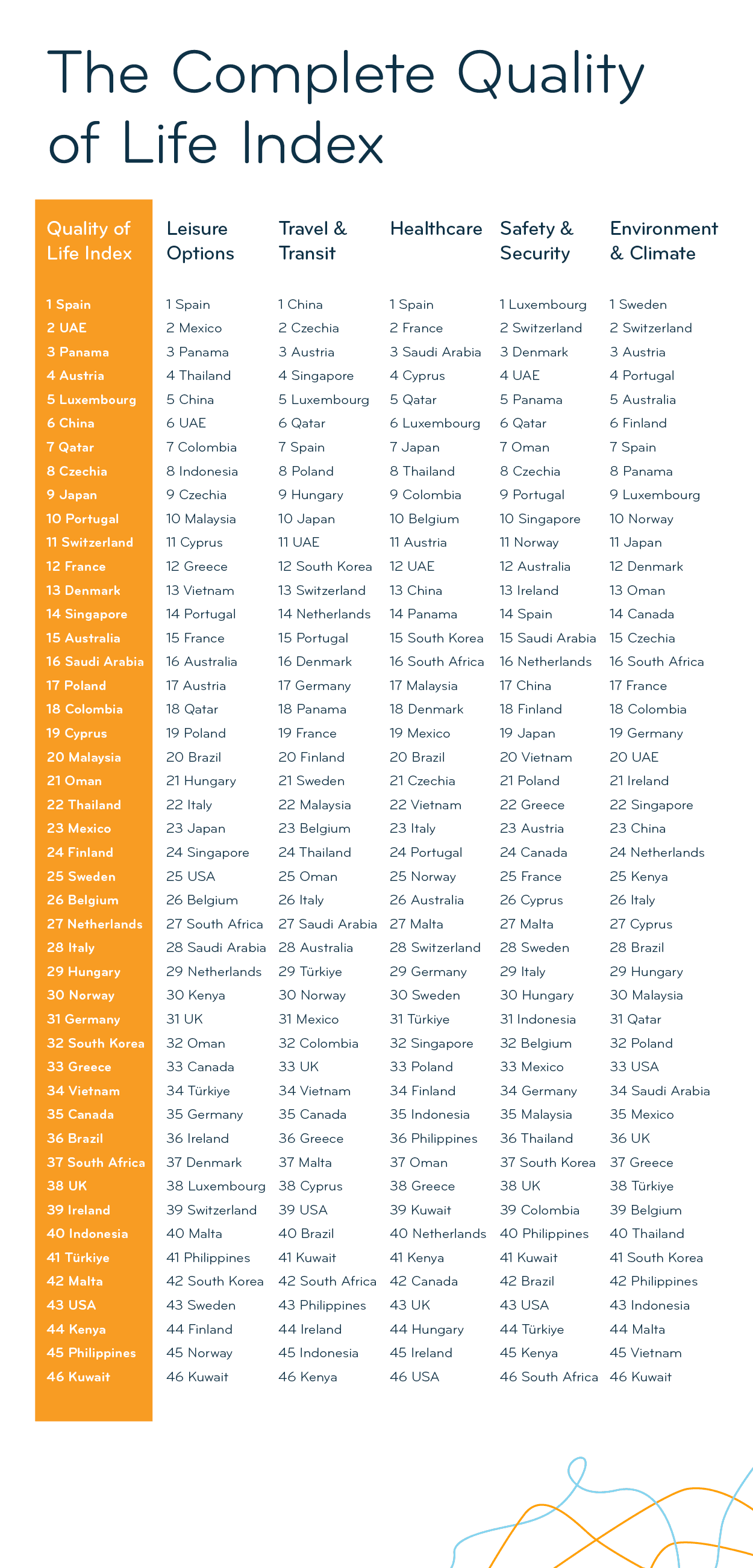
Where Expats Can Find the Best Quality of Life (& Where Not)
European destinations make up the majority of the top 10, but a great quality of life can also be found elsewhere. And one country in particular has fallen far in the ranking.
- Methodology
- Happy & Healthy in Spain (1st)
- Safe & Sound in the UAE (2nd)
- Plenty to Do & See in Panama (3rd)
- An Unpleasant Climate in Kuwait (46th)
- Sunshine Isn’t Everything in the Philippines (45th)
- Great Weather but Little Safety in Kenya (44th)
- Trends in the Top 10
- Trends in the Bottom 10
- The Biggest Winners for Quality of Life
- The Biggest Loser for Quality of Life
- Full Ranking
- Further Reading
- External Resources
The Top 10

Methodology
The Quality of Life Index consists of five subcategories with three to six underlying factors each.
The Safety & Security Subcategory summarizes respondents’ opinions on their personal safety; the political stability; and whether they feel they can openly express themselves and their opinions in their host country.
The Healthcare Subcategory looks into the affordability, availability, and quality of medical care as well as how easy it is to get equal access to all kinds of healthcare services.
The culture & nightlife offering; the culinary variety & dining options; and the local opportunities for recreational sports form the Leisure Options Subcategory.
The Travel & Transit Subcategory sums up the affordability and availability of public transportation; the opportunity to travel; the infrastructure for cars; and whether it’s easy and safe to get around on foot or by bicycle.
Lastly, the Environment & Climate Subcategory is about expats’ satisfaction with the host country’s natural environment; urban environment; air quality; and climate & weather. It also considers how expats rate the availability of green goods and services (e.g., renewable energy, organic food) and whether the government supports policies to protect the environment.
Expats rated these factors on a scale of one (very bad / disagree completely) to seven (very good / agree completely). For a country to be featured in the ranking, it required a minimum of 50 respondents. In 2025, 46 destinations met this threshold.
Happy & Healthy in Spain (1st)
Spain ranks 1st in the Quality of Life Index — an ongoing trend since 2022. So, it’s hardly surprising that large shares of expats move there for a better quality of life (20% vs. 7% globally) or to retire abroad (8% vs. 3%). And in fact, most expats (84%) are happy with their life in Spain (vs. 67% globally).
The reasons for the good result are many: expats love the weather (1st), the culture & nightlife (1st), as well as their opportunities for recreational sports (1st). And that’s just the beginning!
Over four in five respondents agree that Spain offers healthcare that’s affordable (83% positive ratings vs. 59% globally), easily available (82% vs. 68%), and of high quality (81% vs. 67%).


Public transportation is another plus, with expats giving Spain good grades for its affordability (9th) and availability (14th). It’s safe and easy to get around on foot or by bike, too, according to 87% of respondents (vs. 77% globally). Plus, there’s plenty of opportunity to travel (7th).
Reviews for the Safety & Security Subcategory (14th) aren’t quite as glowing. Expats agree they feel safe (87% vs. 81% globally) and can openly express themselves and their opinions (77% vs. 63%). However, results for Spain’s political stability are only average (57% positive vs. 56% globally).
Safe & Sound in the UAE (2nd)
Since placing 5th in 2022, the UAE has steadily climbed up a spot each year to now rank 2nd in the 2025 Quality of Life Index.
Personal safety is a huge highlight (1st), and close to nine in ten respondents (87%) rate the country’s political stability positively (vs. 56% globally). Healthcare, meanwhile, is readily available (6th) and of high quality (3rd), but costs can be an issue (25th).


Around four in five expats praise the culinary variety & dining options (83% vs. 74%) and the culture & nightlife (78% vs. 66%), but recreational sporting opportunities aren’t as abundant (21st).
Maybe outdoor sports are what’s missing? The UAE receives one of its worst results for the natural environment, placing 42nd out of 46 destinations. But thanks to a good availability of green goods and services (8th) and a government that, according to expats, supports policies to protect the environment (1st), even the UAE’s worst-performing subcategory in the index receives an above-average result: 20th for Environment & Climate.
Plenty to Do & See in Panama (3rd)
Panama’s 3rd place in the 2025 Quality of Life Index is a major step up: in 2024, it still ranked 16th out of 53 destinations.
Results have improved across all subcategories of the index except for Healthcare (14th vs. 15th place in 2024). Expats continue to appreciate the quality (14th) and availability (12th) of medical care in Panama, though less so its affordability (22nd).
Leisure Options (3rd) are among the best thanks to the available sporting opportunities (4th) and culture & nightlife (8th). Plus, 83% of respondents rate the culinary variety & dining options positively (vs. 74% globally).


Safety & Security (5th) is another highlight, with nearly every respondent (97%) feeling safe in Panama (vs. 81% globally). Four in five (80%) agree they can openly express themselves and their opinions (vs. 63%), and three-quarters (75%) rate the political stability favorably (vs. 56%).1
However, this high level of safety doesn’t extend into every aspect of life. In 26th place, Panama receives one of its worst results in the index regarding how easy and safe it is to get around on foot or by bicycle. Though public transportation is affordable (5th) and there are plenty of opportunities to travel (3rd).
When it comes to the natural environment, a whopping 99% rate this factor positively (vs. 83% globally). Together with the good air quality (9th) and pleasant climate & weather (9th), this pushes Panama into the top 10 for Environment & Climate despite mediocre results for the rest of this subcategory.
An Unpleasant Climate in Kuwait (46th)
Since 2020, Kuwait hasn’t been able to shake its last place in the Quality of Life Index — and 2025 is no exception. In fact, the country ranks last in two out of the index’s five subcategories, and in the bottom 10 for the remaining three.
The good news: expats are unlikely to have come to Kuwait for lifestyle-related reasons in the first place. Job-related reasons are much more common (70% vs. 36% globally).
According to expats, Kuwait is the worst-performing country when it comes to the Environment & Climate (46th). Around half of respondents rate the natural environment (50%) and the climate & weather (49%) negatively (vs. a respective 7% and 22% globally). And in 42nd place, Kuwait’s result for the urban environment isn’t much better.
Expats are similarly disappointed by the (lack of) Leisure Options (46th), with only the culinary variety & dining options (24th) receiving an average result.


Public transportation is comparatively affordable (26th) but not widely available (39th). Nor do expats have high opinions of the infrastructure for cars (37th) or the opportunity to travel (42nd).
Results across the Healthcare (39th) and Safety & Security (41st) Subcategories are less dire, but still nothing to write home about. For instance, more than half (53%) find they can’t openly express themselves and their opinions (vs. 18%).
Sunshine Isn’t Everything in the Philippines (45th)
Like Kuwait, the Philippines is no stranger to the bottom 10 of the Quality of Life Index. Its second-to-last place in 2025 is a new low, however.
The country receives its “best” result in the index in the Healthcare Subcategory, ranking 36th. This is mainly thanks to equal access to all kinds of healthcare services (18th) and a moderate availability of medical care (29th). Expats are dissatisfied with its affordability (39th), though. And only 45% have something positive to say about its quality (vs. 67% globally).
The pleasant climate & weather (14th) can’t make up for the fact that the Philippines receives bottom 10 results for air quality (38th), the urban environment (43rd), and the availability of green goods and services (45th), resulting in an overall 42nd place for the Environment & Climate Subcategory.
Nor does the sunshine automatically lead to an abundance of sporting opportunities: over a third rate (36%) this factor negatively (vs. 11% globally).
Public transportation — while mostly affordable (21st) — isn’t widely available according to 42% of respondents (vs. 17% globally). And the infrastructure for cars is even worse (58% negative responses vs. 14% globally).


Only around seven in ten expats (69%) feel safe in the Philippines (vs. 81% globally), and the country lands in the bottom 10 for political stability (42nd).
Great Weather but Little Safety in Kenya (44th)
Since 2022, Kenya has regularly featured in the bottom 10 of the Quality of Life Index and 2025 is no different, with the country ranking 44th.
One major pain point: Travel & Transit. Kenya ranks dead last in this subcategory (46th) due to public transportation that’s neither readily available (42nd) nor affordable (45th) and a road network that can’t make up for the fact. Only 41% give the infrastructure for cars a positive rating (vs. 73% globally). Getting around on foot or by bicycle (45th) isn’t safe or easy, either.
Speaking of safety: less than half of expats there (49%) feel safe (vs. 81% globally). Coupled with a low political stability (44th), it’s hardly surprising that Kenya ranks second to last in the Safety & Security Subcategory (45th).
Results are slightly better regarding Healthcare (41st) but not by much. Only around half of respondents agree medical care is of good quality (53% vs. 67% globally) and readily available (48% vs. 68%). And close to double the global average find it expensive (40% vs. 22%).
It’s not all doom and gloom, though. Kenya offers an amazing climate & weather (6th) and a lovely natural environment (15th).


Trends in the Top 10
- Spain
- UAE
- Panama
- Austria
- Luxembourg
- China
- Qatar
- Czechia
- Japan
- Portugal
The top 10 of the Quality of Life Index have seen little change since 2024: only Panama (16th to 3rd), China (19th to 6th), and Czechia (14th to 8th) are new entries in 2025.
European destinations make up the majority: Spain (1st) is joined by Austria (4th), Luxembourg (5th), Czechia (8th), and Portugal (10th). They all perform well to very well across the different areas of the index. Interestingly, they differ in their weak points. Austria receives mediocre results for Safety & Security (23rd), in large part due to political stability (32nd), while Luxembourg cannot offer good Leisure Options (38th). Czechia and Portugal, on the other hand, receive their worst results in the Healthcare Subcategory, ranking 21st and 24th, respectively.
In the Middle East, Qatar (7th) shows similar highs and lows as the UAE (2nd): expats appreciate the Healthcare (5th and 12th, respectively), Safety & Security (6th, 4th), and Travel & Transit (6th, 11th) Subcategories. The natural environment, on the other hand, doesn’t delight (Qatar 44th; UAE 42nd).
The similarities are less noticeable among the two Asian destinations in the top 10: China (6th) and Japan (9th). Both destinations get great results for Healthcare (13th, 7th) and Travel & Transit (1st, 10th). But while China can delight in terms of Leisure Options (5th vs. Japan’s 23rd place), Japan provides the better Environment & Climate (11th vs. China’s 23rd place).
Trends in the Bottom 10
- South Africa
- United Kingdom
- Ireland
- Indonesia
- Türkiye
- Malta
- USA
- Kenya
- Philippines
- Kuwait
The bottom 10 of the Quality of Life Index see a similar development as the top 10: only three countries are new in receiving this dubious distinction: Türkiye (41st), the UK (38th), and South Africa (37th).
Indonesia (40th) joins the Philippines (45th) in representing Southeast Asia. They perform similarly, with bottom 10 results across the Travel & Transit, Environment & Climate, and Safety & Security Subcategories. There’s one big difference, though: while the Philippines sees 41st place for Leisure Options, Indonesia makes it into the top 10 for this subcategory, ranking 8th!
A big difference can also be found when comparing the two African destinations in the bottom 10: Kenya (44th) and South Africa (37th). While expats in the former are not satisfied with the available Healthcare (41st), South Africa receives a good 16th place in this subcategory. Personal safety remains an issue, though, with South Africa and Kenya ranking last and second to last, respectively.
Malta (42nd), Ireland (39th), and the United Kingdom (38th) are three European countries in the bottom 10. The reasons why vary. Despite good weather (7th), Malta loses a lot of ground with the Environment & Climate (44th), and expats have few positive things to say about Leisure Options (40th) and Travel & Transit (37th). The latter is also an issue in Ireland (44th), where public transportation is scarce (43rd) and unaffordable (42nd). However, Ireland’s biggest issue is Healthcare (45th): the country lands in last place for three out of the four underlying factors! Expats’ opinion on the topic in the UK isn’t much better (43rd).
Geographically speaking the odd ones out are the USA (43rd) and Türkiye (41st), next to last-placed Kuwait (46th). Both receive at best mediocre results in the index: for example, the USA places 25th for Leisure Options and Türkiye 29th for Travel & Transit. But these results can’t compensate for where they perform rather badly.
The USA ranks dead last when it comes to Healthcare and receives disappointing results in the Safety & Security Subcategory (43rd). Safety is also an issue in Türkiye (44th), which additionally lands in the bottom 10 of the Environment & Climate Subcategory (38th) — despite the good weather (79% positive ratings vs. 58% globally).
The Biggest Winners for Quality of Life
After a disappointing 39th place out of 53 destinations in the 2024 Quality of Life Index, Malaysia rose 19 spots to rank 20th in 2025. This is thanks to improved results across nearly every single factor of the index. In fact, only the affordability of public transportation is rated slightly worse in 2025 (18th vs. 17th in 2024).
The culinary variety & dining options in the country remain a highlight (6th in 2024 and 2025). They are joined by more opportunities for recreational sports and a better culture & nightlife offering: over a third (36% each) give these factors the best possible rating in 2025, compared to just 26% and 27%, respectively, in 2024.
One of Malaysia’s worst areas in the index — Safety & Security — has even managed to leave the bottom 10. Following 49th place in 2024, Malaysia now ranks 35th in this subcategory.
In contrast, the improved results for Cyprus — with a jump from 33rd to 19th in the 2025 Quality of Life Index — are more focused. Healthcare continues to delight (6th in 2024 to 4th in 2025); Safety & Security remains decent (28th to 26th); and Travel & Transit could be better (47th to 38th).
Where Cyprus really made gains is the Leisure Options Subcategory: following 37th place in 2024, it now ranks 11th. While close to one in five respondents in 2024 were dissatisfied with the culture & nightlife on offer, this has nearly halved (19% in 2024 vs. 11%). And the share of expats satisfied with the culinary variety & dining options went from 74% to 86% in 2025.
The Environment & Climate Subcategory also saw some improvements, going from 42nd to 27th in 2025. However, with a bottom 10 place for the urban environment (40th), availability of green goods and services (38th), as well as the government’s support of policies to protect the environment (37th), there’s plenty of room to grow.
The Biggest Loser for Quality of Life
South Korea is the biggest loser in the Quality of Life Index, placing 32nd in 2025. A year earlier, the country ranked 10th out of 53 destinations, receiving praise particularly for its Healthcare (1st).
An aging population is putting a growing strain on the country’s healthcare system, though, and reform efforts in 2024 led to major disputes in the sector with thousands of doctors-in-training stepping down.2 It seems hardly surprising that expats are less satisfied with the quality of medical care (from 2nd to 17th in 2025). In 2024, over three-quarters (76%) agreed that it’s easy to access all kinds of healthcare services in South Korea. In 2025, this share is down to 58%. Interestingly, expats still positively rate the general availability of healthcare services (7th).
South Korea’s recent political crisis, which led to massive protests and ended with the impeachment of then-President Yoon Suk-Yeol,3 is also reflected in the survey results. In 2024, just 6% had something negative to say about the political stability in the country. A year later, this share has risen to nearly a third (31%), with South Korea consequently falling to the bottom 10 for Safety & Security (37th).
The country also receives bottom 10 results in the Environment & Climate (41st) and Leisure Options (42nd) Subcategories. While it’s never done particularly well in these topics, this too reflects worsening opinions by expats. For instance, satisfaction with the culinary variety & dining options has gone from 74% happy expats in 2024 to just 58% in 2025.
Full Ranking

Further Reading
- The Best & Worst Countries for Expats in 2025
- Living the Good Life in Spain
- Long Hours for a Great Life in the UAE
- Expats in Panama Are Happiest with Their Life Abroad
- Amid a Turbulent Political Climate, South Korea Slips to the Bottom
- Expat Insider 2024: Top Places for a Top Quality of Life (& Where Not to Move)
External References
- Reuters: Panama temporarily suspends some constitutional guarantees in protest-rocked province. 20 Jun 2025.
- Reuters: South Korea offers to freeze medical student numbers to resolve 13-month dispute. 7 Mar 2025.
- CCN World: South Korea’s impeached president is removed from office, four months after declaring martial law. 4 Apr 2025.
Advertisement
Join InterNations
The community for expats worldwide
Download

